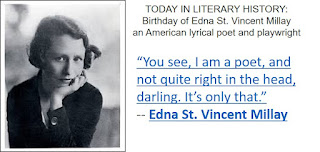Throughout much of her career, Pulitzer Prize-winner Edna St. Vincent Millay was one of the most successful and respected poets in America.
Encouraged to read the classics at home, as she was too rebellious to make a success of formal education, resulted in her winning poetry prizes from an early age, including the Pulitzer Prize in 1923, and she went on to use verse as a medium for her feminist activism.
Like her contemporary Robert Frost, Millay was one of the most skillful writers of sonnets in the twentieth century, and also like Frost, she was able to combine modernist attitudes with traditional forms creating a unique American poetry.
From the age of eight Millay was reared by her strong, independent mother, who divorced the frivolous Henry Millay and became a practical nurse in order to support herself and her three daughters. Though the family was poor, Cora Millay strongly promoted the cultural development of her children through exposure to varied reading materials and music lessons, and she provided constant encouragement to excel. Millay recalled her mother’s support in an entry included in Letters of Edna St. Vincent Millay: “I cannot remember once in the life when you were not interested in what I was working on, or even suggested that I should put it aside for something else.”
Only through fortunate chance was Millay brought to public notice. Her mother happened on an announcement of a poetry contest sponsored by The Lyric Year, a proposed annual anthology. Millay submitted some poems, among them her “Renascence.” Ferdinand Earle, the editor, liked the poem so well that he wrote to “E. Vincent Millay,” as she styled herself, expressing confidence that it would be awarded the first prize. Because the other judges disagreed, “Renascence” won no prize, but it received great praise when The Lyric Year appeared in November, 1912.
“Building Your Great Collection One Fine Book at a Time”
Check us out at BlindHorseBooks.com







Comments
Post a Comment